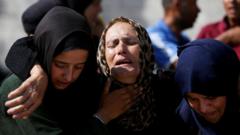Iran's recent suspension of cooperation with the International Atomic Energy Agency (IAEA) marks a critical juncture in global nuclear oversight, as the country grapples with escalated tensions from its ongoing conflict with Israel.
Nuclear Oversight Suspended: Iran Halts Cooperation with U.N. Watchdog

Nuclear Oversight Suspended: Iran Halts Cooperation with U.N. Watchdog
On the heels of intensified military conflict, Iran's decision raises fears of a clandestine nuclear program.
In a significant development, the United Nations’ nuclear watchdog announced that its inspection team has left Iran after the country enacted legislation on Wednesday halting any cooperation with the IAEA. This decision further obscures the oversight of Iran's contentious nuclear program amidst a backdrop of military strikes from both Israel and the United States, raising alarms regarding the potential for Iran to pursue a nuclear weapon.
The IAEA confirmed that its team departed Iran after a period of monitoring during the military conflict, which has left Iran's nuclear facilities vulnerable and under scrutiny. This situation escalated following Israel's attacks on various Iranian military and nuclear sites, which critics argue were partly sanctioned by the IAEA’s recent censure of Iran for noncompliance with nuclear nonproliferation obligations. The agency reported that Iran's stockpile of highly enriched uranium, capable of being used for nuclear weapon development, remains unmonitored, amplifying fears of a shift towards covert operations.
As the effects of the conflict linger, Iranian President Ebrahim Raisi's government has conditioned any potential return to cooperation on two primary demands: the assurance of safety for its nuclear program and scientists, and acknowledgment of Iran's legal right to enrich uranium under international law. Meanwhile, Iranian officials have expressed a renewed inclination towards diplomatic engagement with global powers, signaling a complicated diplomatic path ahead as the nation balances external pressures with internal policies.
While the situation unfolds, the IAEA emphasizes the urgency of restoring its monitoring presence in Iran, stressing the importance of dialogue to mitigate the risks associated with Iran's nuclear ambitions. With diplomatic avenues opening slightly, the future of nuclear oversight in Iran remains uncertain as tensions between international accord and national interest collide.
The IAEA confirmed that its team departed Iran after a period of monitoring during the military conflict, which has left Iran's nuclear facilities vulnerable and under scrutiny. This situation escalated following Israel's attacks on various Iranian military and nuclear sites, which critics argue were partly sanctioned by the IAEA’s recent censure of Iran for noncompliance with nuclear nonproliferation obligations. The agency reported that Iran's stockpile of highly enriched uranium, capable of being used for nuclear weapon development, remains unmonitored, amplifying fears of a shift towards covert operations.
As the effects of the conflict linger, Iranian President Ebrahim Raisi's government has conditioned any potential return to cooperation on two primary demands: the assurance of safety for its nuclear program and scientists, and acknowledgment of Iran's legal right to enrich uranium under international law. Meanwhile, Iranian officials have expressed a renewed inclination towards diplomatic engagement with global powers, signaling a complicated diplomatic path ahead as the nation balances external pressures with internal policies.
While the situation unfolds, the IAEA emphasizes the urgency of restoring its monitoring presence in Iran, stressing the importance of dialogue to mitigate the risks associated with Iran's nuclear ambitions. With diplomatic avenues opening slightly, the future of nuclear oversight in Iran remains uncertain as tensions between international accord and national interest collide.






















